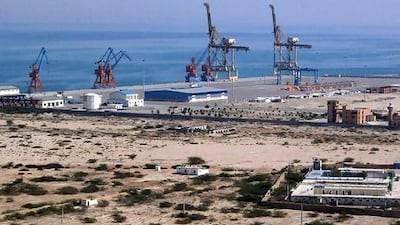China formally took over the operational control of the Gwadar Port in Pakistan's south-western Balochistan province during the first visit to Pakistan by China's premier, Li Keqiang, last month. Under a contract signed between the two countries in February this year, the port has been handed over to the China Overseas Ports Holding Company, which has purchased all the shares in Gwadar Port project from the Port of Singapore Authority (PSA).
China has become the operator of the strategic port, which it has largely built and funded.
Pakistan plans to develop Gwadar Port City on the pattern of Dubai. The government of the newly elected prime minister, Nawaz Sharif, has declared Gwadar as a duty-free port on the lines of Jebel Ali . If mega development projects are smoothly and timely materialised, Gwadar may turn into a city, which will be comparable with Singapore, Hong Kong, Colombo and Dubai.
Gwadar has a special significance with reference to its geo-strategic location and potential for development of trade links with the nations of the Central Asian Republics (Cars), Arabian Gulf and East Africa as well as north-western India. Gwadar port has land access to the whole of Asia and it has also easy sea access to the Gulf ports.
Islamabad and Beijing plan to link Gwadar in Balochistan with China's far western province of Xinjiang through several road and rail connectivity projects. Development activity in Balochistan and Xinjiang is expected to bring an economic bonanza for both countries.
Then there is a geographical proximity of Kashgar, western China's main city, with Gwadar, which is close to the Middle East and Central Asia. Trade through Gwadar port would cut thousands of kilometres off the distance to ship oil from the oil-rich regions to China.
No doubt, Gwadar port is commercially important for China, as it may help China to trade with the Central Asian and Gulf states. There are not two opinions about the potential of the Arabian Sea port that would enable China to gain access to Middle East for oil imports, which may be shipped to western China through Pakistan.
China direly needs port facilities that would ideally be in the proximity area of the Gulf yet be outside the sensitive Strait of Hormuz. Gwadar port provides China an alternative to the Strait of Malacca, through which 80 per cent of its oil imports flow.
China is expected to invest US$10 billion to make the strategically located port fully functional to serve as mother port of the region.
Security will be the biggest challenge for China, which plans to develop Gwadar as a gateway port for its western region.
Will China be able to secure energy and maritime routes through a port surrounded by the restive regions? The separatist movements in Balochistan and Xinjiang pose grave threats to the Chinese interests in Gwadar. The separatists may dampen the China's prospects for strategic access to energy-rich Central Asia through the Pakistan-China energy and trade corridor.
Balochistan reels from a separatist insurgency and sectarian violence. The Baloch separatists, who are engaged in a struggle against the Pakistani armed forces, are fighting for an independent Balochistan. Engaged in many development projects, the Chinese have been attacked several times in the province. In 2004, three Chinese engineers working on the seaport project were killed in a terrorist attack in Gwadar.
Terrorist activity may turn the whole scheme of developing Gwadar into a gateway port for western China upside-down. Beijing's ambitious plans for establishing trade and energy corridors are likely to be held hostage to the terrorist activity in Xinjiang and Balochistan and the port linking the two restive regions is likely to remain a commercial failure under the Chinese. Ironically, the terrorist incursions into western China could change the proposed trade corridor into a terror corridor putting billions of dollars of investment at stake.
One thing should be very clear: that it is not the development or foreign investment that will bring peace, but it is peace and stability that can bring foreign investment and development projects to fruition in Gwadar.
Gwadar is foreseen as the future Dubai of the subcontinent. As a free trade zone and a corridor to cars, Gwadar offers great economic opportunities to international investors.
The port has many natural advantages. It may emerge as a natural access port to Asia for trade and commerce. A road can connect it to the Iranian port of Chahbahar and thus to the Iranian road network. A road linkwith the RCD highway can give it access not only to the whole of Central Asia, but also south-western China. It is more economically feasible for China to have land access to Kashgar through Gwadar because of the Karakoram Highway.
It is, however, keeping the peace that is the real key to developing Gwadar into a new Dubai. It is because of peace and stability in Dubai that the head offices of a number of multinational companies are located there. More than 2,800 companies from more than 100 countries are based in Dubai.
Syed Fazl-e-Haider is a development analyst in Pakistan. He is the author of many books, including The Economic Development of Balochistan, published in May 2004

